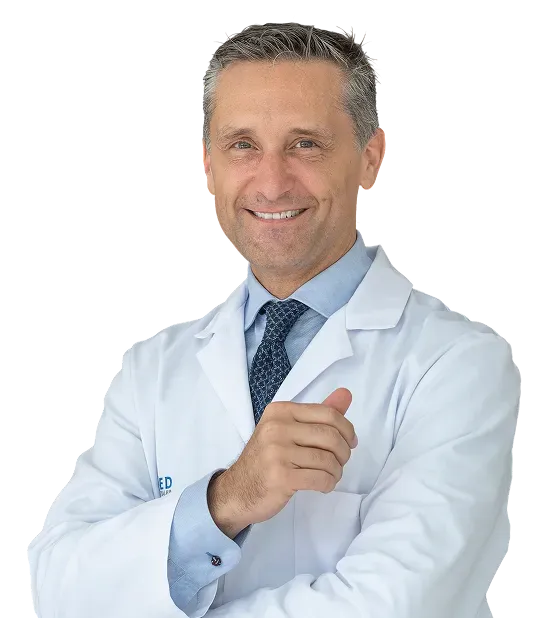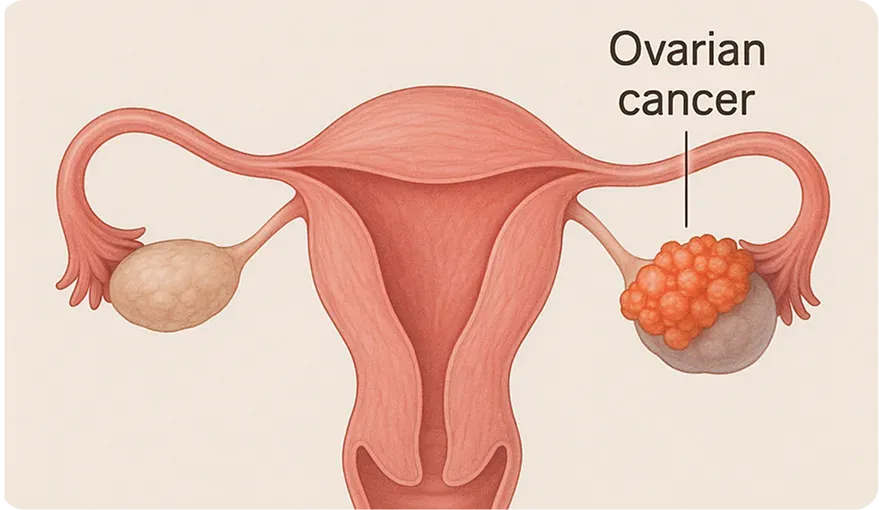Treatments
Radical Cytoreduction Surgery for Advanced Ovarian Cancer
Specialized Multidisciplinary Surgical Treatment for Peritoneal Carcinomatosis
Dr. Lucas Minig – World class expert in radical cytoreduction surgery for advanced ovarian cancer with peritoneal carcinomatosis
Request Consultation or Second Opinion

Facing Advanced Ovarian Cancer with Clarity and Compassion
An ovarian cancer diagnosis with peritoneal spread can feel devastating. But you’re not alone—and you do have options.
At our internationally recognized center in Valencia, Dr. Lucas Minig leads a specialized multidisciplinary team trained in radical cytoreductive surgery for advanced-stage ovarian cancer. Our approach focuses on complete disease removal, fertility considerations (when feasible), and whole-person support through every step of your journey.
DOWNLOAD A FREE Roadmap
Download the Ovarian Cancer Recovery & Wellness Guide (PDF)
What Is Radical Cytoreduction—and Why It Matters?
Up to 80% of women diagnosed with ovarian cancer are already in advanced stages (Stage III–IV). In these cases, cancer has spread to the abdominal lining (peritoneum), forming small implants on the intestines, liver, spleen, or diaphragm.
Radical cytoreductive surgery aims to remove all visible tumors, including those outside the ovaries. When performed by a trained gynecologic oncologist and a multidisciplinary team, it significantly improves survival—even in advanced cases.
“The most important modifiable factor in survival is how completely we remove the disease at surgery.”
— Dr. Minig
Patients from around the world trust our expertise to treat even the most complex cases that local providers may not manage.
Our Approach: Advanced Surgery, Personalized for You
At our center, cytoreduction is not just a procedure—it’s a coordinated effort. Depending on the case, surgery may include:
- Removal of ovaries and uterus
- Peritoneal resections
- Bowel segment removal and reconnection
- Splenectomy or liver surface tumor removal
- Diaphragm stripping
Each surgery is customized based on your disease spread, health status, and treatment goals.
Our team collaborates with surgical specialists in colorectal, hepatobiliary, and thoracic oncology to ensure the best outcome possible.

When Is Surgery Performed?
There are two main pathways:
- Primary Cytoreductive Surgery
This is performed immediately after diagnosis, if the tumor burden is operable and the patient is in stable condition. It’s our preferred approach when possible.Dr Minig & his multidisciplinary team achieve a complete surgical tumor removal in over 95% of patients - Interval Cytoreduction After Chemotherapy
If the disease is located in unresectable sites or in women with advanced age, we begin with 3 cycles of chemotherapy (neoadjuvant treatment). Then we reassess and schedule interval surgery once the tumor load is reduced.
Our surgical strategy is always individualized and guided by the latest evidence-base medicine and experience.
Recovery timeline: What to expect
Healing after radical cytoreduction surgery is a journey—and we guide you through every step with clarity, compassion, and personalized support.v
Days 0-1
ICU admission. Visit by Dr Minig in-person
Days 1
Discharge: in-person visit by Dr. Minig
Day 2
Normal room with progressive recovery according with disconfort. Daily visit by Dr. Minig in-person with direct access 24/7
Days 7-10
Hospital discharge by Dr. Minig in-person.
Days 10- 20
Progressive home recovery. Direct access to Dr. Minig 24/7
Day 15 - 20
Travel to your city/country, virtual or direct access to Dr. Minig 24/7
Week 4-6
Chemotherapy treatment, if needed. virtual or direct access to Dr.Minig 24/7
Month 2-6
Onwards: schedules virtual follow-ups with Dr. Minig
We’re not just focused on removing the disease—we’re here to support your life after surgery, too.
“I left the hospital the next day with almost no pain — and no large scar to remind me.”
— Marta S., Valencia
Why Experience Matters
Cytoreductive surgery is complex. Outcomes vary widely depending on the surgeon’s training. Studies show survival improves by 30% when this procedure is performed by gynecologic oncologists specifically trained in advanced ovarian cancer surgical techniques.
Dr. Lucas Minig completed a specific 4-year training program in Italy and United States; and has over 20 years of surgical experience in high-complexity gynecologic oncology and leads one of the few international teams capable of full macroscopic tumor removal in over 95% of operable cases.
Is This Surgery Right for You?
Not every patient is a candidate for immediate surgery. Factors we consider:
- age and overall health
- nutritional status
- disease extension
- personal preferences and goals
If you’ve been told your cancer is “inoperable,” we recommend a second opinion. Many patients find new possibilities with our expert surgical review.
What’s Next?
Whether you’re just beginning to explore treatment or seeking a second opinion, our team is here to help. We’ll review your case quickly and give you a clear, personalized path forward—with honesty and hope.
Why choose Dr. Minig & our team
More than a clinic — we are your international partner in healing.
With over 20 years experience treating global patients, we offer personalized surgical care and full logistical support for those traveling to Valencia.
- Specialized Expertise: Dr. Minig is a gynecologic oncologist with advanced training in complex surgical techniches to treat advanced ovarian cancer with peritoneal carcinomatosis
- Individualized Care: We align treatment with your pain tolerance, fertility desires, and lifestyle.
- Whole-Woman Approach: From surgery to nutrition and emotional well-being, we support every facet of your health.
- Industry-Leading Research & Innovation
- Global Reach: Personalized logistical support for international patients

International patient welcome
Whether you’re in Europe, North America, or beyond, our clinic offers:
Tele-Consultations in English, Spanish and Italian
Concierge Travel Assistance for visas, lodging, and local transportation
Flexible Scheduling to accommodate your time zone
Frequently asked questions
Why is radical cytoreductive surgery so important for advanced ovarian cancer?
Because it’s the only modifiable factor that significantly impacts survival. Removing all visible tumor deposits—even in complex cases of peritoneal carcinomatosis—dramatically improves long-term outcomes. The more complete the removal, the better the chance of remission and extended survival. That’s why this surgery must be performed by highly trained gynecologic oncologists.
What does the recovery process look like after surgery?
Recovery depends on the extent of the disease and the procedures performed. Most patients stay in hospital for 5–7 days, begin walking within 48 hours, and gradually resume eating and daily activities. International patients often return home 2–3 weeks after surgery, with virtual follow-ups and coordinated local care provided.
Will I need chemotherapy after surgery?
Yes—in nearly all cases, 6 cycles of chemotherapy are administered after surgery to treat any remaining microscopic disease. Your oncologist will tailor the regimen based on tumor biology, genetic markers (like BRCA), and your overall health. We’ll guide you through each step of your recovery and treatment plan with compassionate, personalized care.
Ready for Relief? Let’s talk.
Whether you want our symptom kit, the patient guide, or to speak directly with Dr. Minig, we’re here for you.
